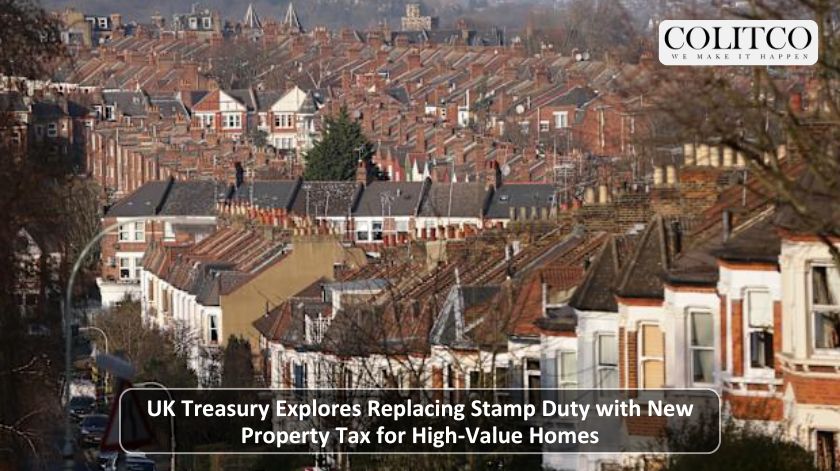The UK Treasury is examining a radical overhaul of property taxation that could see stamp duty replaced with a new property tax on homes worth more than $1.03 million. Chancellor Rachel Reeves has reportedly asked officials to model the impact of this “proportional” national property tax as part of potential changes announced in the upcoming Autumn Budget.
The rate of property tax applied is expected to be based on the value of a home and will not replace stamp duty on second homes. This represents a significant shift in how the UK taxes property transactions, moving away from a buyer-paid system to one where sellers bear the cost.

Rachel Reeves, Chancellor of the Exchequer
What’s Being Proposed
The new levy would be paid by owner-occupiers on houses worth more than $1.03 million when they sell their home, with the amount due determined by the value of the property and a rate set by the government. Unlike the current stamp duty system, this tax would be collected directly by HM Revenue and Customs rather than being paid upfront by buyers.
The proposal draws from research by the centre-right think tank Onward, authored by former government adviser Tim Leunig. At a rate of 0.54%, with a 0.278% supplement on values over $2.05 million, the levy “would raise the same amount as stamp duty”.
Key Features of the Proposed System:
- Applies only to properties over $1.03 million
- Paid by sellers, not buyers
- Rate determined by property value
- Collected through HMRC
- Second homes would remain under existing stamp duty arrangements
Market Impact Analysis
The change would dramatically reduce the number of transactions subject to property taxes. The tax would be paid by owner-occupiers on houses worth more than $1.03 million when they sell their home, impacting around a fifth of the market. This compares favourably to stamp duty, which is paid in bands tied to property prices, currently impacts around 60 per cent of the market and is considered to be a serious barrier to home ownership, particularly for first-time buyers.
The most recent house price index from the government – which covers May – showed London was the only region where house prices exceeded $1.03 million, with an average value of $1.16 million. The average price for houses across the UK was $551,450. This suggests that most homeowners outside London would be completely exempt from the new tax.
Industry Reactions Mixed
Property industry professionals have expressed cautious optimism about reforming stamp duty whilst warning against creating new burdens for homeowners.
Paula Higgins, founder and CEO of the HomeOwners Alliance, stated: “Stamp duty is unfair, outdated and stalls the housing market. Our research shows that nearly half of homeowners considering a move say Stamp Duty puts them off, and it particularly penalises growing families and downsizers“.
However, she cautioned against the new tax becoming a “money grab”, warning: “On the suggestion of introducing a new property tax there shouldn’t be a money grab by treasury at the expense of homeowners. It’s an attack on homeowners and history shows that introducing a new tax is never followed by the removal of older taxes“.
Simon Gerrard, chairman of Martyn Gerrard Estate Agents and past president of Propertymark, welcomed stamp duty reform but expressed concerns about implementation. He is particularly concerned what the move might mean for those starting a family in London, where property prices are significantly higher than the average.
Political Opposition
Conservative shadow chancellor Sir Mel Stride criticised the proposals, arguing: “The Conservatives have warned that more taxes are coming and now reports are emerging that the family home is next in the firing line. This tax grab would punish families for aspiring to own their own home“.
He added: “Under Labour nothing is safe. Your home, your job, your pension – the Chancellor has all of it in her sights. Rachel Reeves will tax your future to pay for her failure“.
Treasury’s Fiscal Pressures
The consideration of new property taxes comes as Chancellor Reeves faces significant fiscal challenges. The National Institute of Economic and Social Research (NIESR) has estimated that taxes may have to go up by more than $102.5 billion to cover costs and restore a credible headroom that will make bond traders more assured about Labour’s fiscal plans.
Stamp duty receipts from April to June showed that the tax collector was paid $9.43 billion, $820,000 more than the previous year. Any replacement system would need to generate similar revenues whilst supporting the government’s economic objectives.
Current Stamp Duty Context
The potential reform comes after recent changes to stamp duty that have already impacted the property market. From 1st April 2025, the nil rate threshold which was previously $512,500 returned to $256,250, whilst the nil rate threshold for first time buyers decreased from $871,250 to $615,000.
These changes have created additional costs for property buyers, particularly affecting first-time buyers who previously enjoyed higher thresholds. Now first-time buyers won’t pay stamp duty on properties up to only $615,000, and they’ll only get first-time buyers’ relief on properties up to $1.03 million (5% on properties $615,000 to $1.03 million).
Official Government Response
A Treasury spokesperson maintained the government’s position on fiscal policy: “As set out in the plan for change, the best way to strengthen public finances is by growing the economy – which is our focus. Changes to tax and spend policy are not the only ways of doing this, as seen with our planning reforms, which are expected to grow the economy by $13.94 billion and cut borrowing by $6.97 billion“.
The spokesperson emphasised Labour’s election commitments: “We are committed to keeping taxes for working people as low as possible, which is why at last Autumn’s Budget, we protected working people’s payslips and kept our promise not to raise the basic, higher or additional rates of income tax, employee National Insurance, or VAT“.
Also Read: Trump Hosts Historic White House Summit as European Leaders Unite Behind Ukraine Peace Initiative
Looking Ahead
No date has been confirmed for the Autumn Budget, but it has been speculated that the statement will be made between 28 October and 4 November. The Chancellor is expected to announce measures to address what she has described as a significant gap in public finances.
The property tax proposal represents part of a broader consideration of wealth-based taxes, as the government seeks to balance fiscal responsibility with its election pledges not to increase taxes on working people. Whether these proposals make it into the final budget will depend on further Treasury analysis and political considerations.
For homeowners and property investors, the coming months will be crucial in determining whether the UK’s property taxation landscape faces its most significant transformation in decades. The focus on high-value properties suggests an attempt to target wealth whilst minimising impact on average homeowners, but implementation details remain to be seen.












